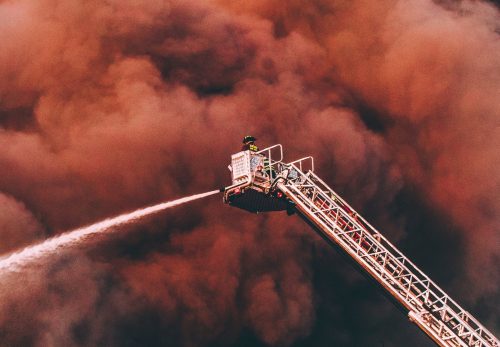As wildfires raged across the West Coast this summer, California faced a uniquely American problem: they were short on their usual band of inmate firefighters—who usually work for under $2 a day—after many had been released to limit the spread of COVID-19. In a cruel twist, California would not hire formerly incarcerated individuals with years of firefighting experience due to their prior convictions, despite the shortage. While Gov. Newsom has helped rectify this double standard since, it draws attention to the dire labor conditions which 2.3 million incarcerated Americans face daily.
Corporations exploit the criminal justice system most glaringly through private prisons, a $5 billion industry whose inmate population grew by 47% between 2000 and 2016, far outpacing the 9% growth of the general prison population. Any business model that depends on an ever increasing number of incarcerated individuals represents a vile side of free market capitalism.
Unsurprisingly, this routinely leads to shoddy practices as prison owners stretch profit margins from their government contracts by employing fewer and less well trained guards or depriving inmates of physical and mental healthcare. Compared to public prisons, private facilities are more violent and lead to a 22% higher reconviction rate, something the largest private prison corporation actually brags about to potential investors.
Still, only 8.5% of prisoners are held in for-profit prisons, so the much bigger concern is the state and federal facilities where nearly all inmates are required to work. Although they can technically refuse, the threat of punishment creates perverse incentives to accept any assignments, no matter how menial, dangerous, or underpaid. All told, about 17,000 prisoners work through Federal Prison Industries—usually for the federal government, though also sometimes private companies—generating a revenue of $500 million annually. A similar state level program relies on the labor of 63,000 prisoners to generate upwards of $1 billion annually, while all remaining prisoners do maintenance work within the prison. In each case, prisoners typically receive just cents per hour while gaining almost no meaningful job skills, and some states pay no compensation at all.
Prisons can also deduct almost half of a prisoner’s pay for fines or court fees, which can trap low-income individuals into a dangerous cycle of poverty, debt, and reincarceration for failing to meet these financial obligations. Inmates often face additional charges for necessary food, clothing, and medical care. Therefore, many prisoners reenter society with meager savings and limited job prospects.
Mass incarceration undoubtedly ruins lives, and our criminal justice system has long targeted Black and Latinx communities disproportionately. But it hurts everyone when we set up formerly incarcerated folks to fail by not paying them a fair wage. Ultimately, the more Americans with stable jobs and disposable incomes, the better our economy does—yet in the first year after leaving prison, nearly half of former inmates earn no money at all. Of those who do, only 20% earn more than $15,000, and their conviction typically disqualifies them from receiving any government assistance. That’s not just bad for these individuals and their families—it’s bad for the entire economy.
A groundbreaking 2016 study estimated that the full social costs of mass incarceration—including lost wages, decreased life expectancy, negative impacts on children, and the prison’s system propensity to actually increase crime—total a staggering $1 trillion, far exceeding the prison system’s $80 billion of annual operational costs.
Even the most apathetic economist should recognize the deep and extensive harm our current system causes. It’s clear that we need far more criminal justice reforms than just paying prisoners fairly for their labor, including drastically reducing our incarcerated population. But providing prisoners a fair income—and allowing them to save—is a critically important first step towards a prison system of rehabilitation rather than widespread destruction of individual lives and macroeconomic futures.
